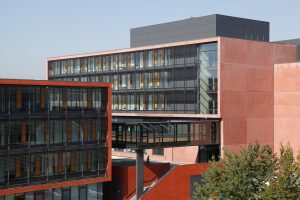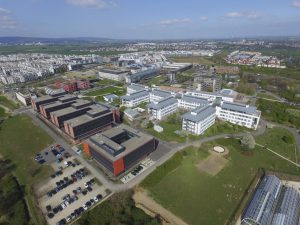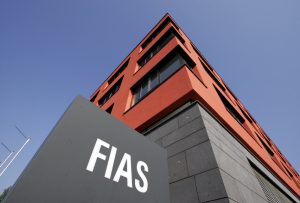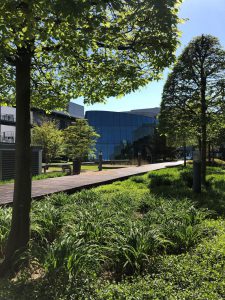Campus Frankfurt Riedberg: the science city
If there’s one German city that’s always been keen on the construction of new buildings, high rise or low rise, it’s Frankfurt. With the Riedberg development, the city went one step further and constructed a new city quarter from scratch so that new homes could be built for 16 thousand residents. The new city quarter on the hill is also home to Goethe University Frankfurt’s new science campus: four science faculties rub shoulders with two Max Planck Institutes, the Buchmann Institute for Molecular Life Sciences, the Helmholtz International Center for FAIR and Innovectis, the university’s technology transfer company.

Never heard of Frankfurt’s Goethe University? It’s Germany’s 3rd largest university by number of students and has produced many leading-edge scientists including several Nobel laureates. Today, its best known alumnus is certainly Juergen Klopp: he graduated from Goethe University with a degree in sport sciences in 1995. His fond reminiscence of student life in Frankfurt was part of a “happy birthday” message filmed for his alma mater’s centenary in 2014.

True to its roots as a university founded by the citizens of Frankfurt, the university is set up with a maximum level of independence. Citizens acting as donors also played a crucial role in the creation of the new campus: the Buchmann institute and the Giersch Science Center are dedicated to cross-functional research projects, and were both funded by family trusts.
The scientists on the Riedberg Campus are far from isolated: on the contrary, most of the state of the art infrastructure such as the BMRZ is available to a wide range of researchers. Its liquid- and solid state NMRs and EPR spectrometers, for example, are part of the European iNEXT consortium.
If the protein research conducted at the BMRZ is not your cup of tea, how about a construction site digging an enormous hole into the ground? FAIR, short for Facility for Antiproton and Ion Research, is currently digging a very expensive, round-shaped hole into the ground near Darmstadt, to the south of Frankfurt. The hole is being filled with a large scale proton accelerator facility, and discoveries stemming from this Helmholtz facility will rewrite numerous laws of physics. The Helmholtz International Centre, based on the Riedberg Campus, is connected to this and many other fascinating research projects. The HIC’s neighbour is the Frankfurt Institute for Advanced Studies (FIAS), an independent research institute bringing together researchers in the areas of physics, mathematics, brain research, life sciences and computer science.

Thanks to excellent public transport links between Riedberg and central Frankfurt two further research institutes are within easy reach of the campus: the Ernst Strüngmann Institute for Neuroscience in cooperation with the Max Planck Society, and Fraunhofer IME’s Translational Medicine facility, creating powerful international research networks in Frankfurt.
Networking is easy in Frankfurt: after all, the city is home to Germany’s largest airport, is a major trade fair location, and is only a one–hour train commute to Cologne, Heidelberg, Darmstadt, Mannheim, Wiesbaden, Mainz, Giessen and many other cities. The Riedberg Campus is linked through research projects to many hospitals in the Rhine Main area, especially Goethe University Hospital Frankfurt.
To benefit from all these advantages, the FIZ, short for Frankfurt Biotechnology Innovation Center, offers office and lab space for rent at the heart of the Riedberg Campus. In addition to labs and office space, the FIZ offers a canteen, cafeteria, a crèche for employees’ children and open air barbecue facilities.

Please contact us to find out more about life science opportunities in Frankfurt.